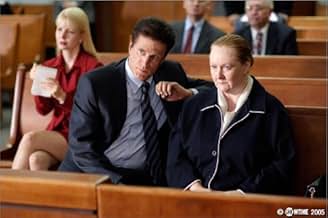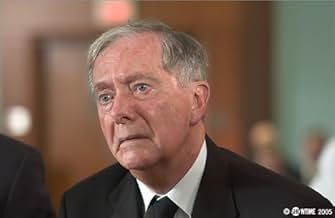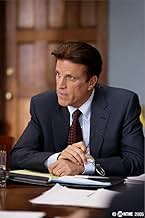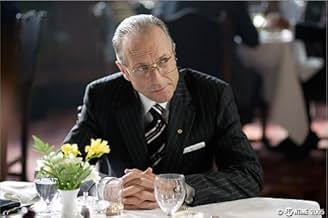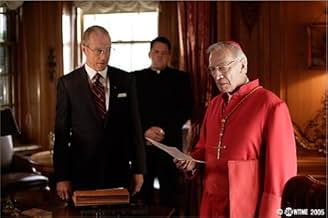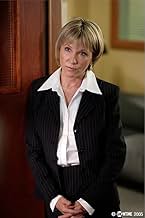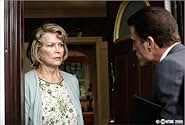Füge eine Handlung in deiner Sprache hinzuA dramatized account of the hidden sexual abuse and scandal that shook the foundation of the Catholic Church, and the characters, events, and policies that brought the abuse and scandal into... Alles lesenA dramatized account of the hidden sexual abuse and scandal that shook the foundation of the Catholic Church, and the characters, events, and policies that brought the abuse and scandal into existence.A dramatized account of the hidden sexual abuse and scandal that shook the foundation of the Catholic Church, and the characters, events, and policies that brought the abuse and scandal into existence.
- Regie
- Drehbuch
- Hauptbesetzung
- Für 2 Primetime Emmys nominiert
- 8 Nominierungen insgesamt
James Aaron Oliver
- Patrick McSorley
- (as James Oliver)
Empfohlene Bewertungen
I have seen this movie and am a practicing Catholic from Boston who worked in a rectory at age 12 in 1964 and did not hear of any abuse. I think the movie did a great job. I lived through the scandal. Before this happen I always said Cardinal Law had to be a cardinal because he could not get that ego in regular size church. You cant believe what this scandal has down to our diocese. And we cant blame lawyers or the media the only real culprit are the pedophile priests and those the covered it up. A a practicing Catholic I have always been aware of the secrecy in the everyday Church. When a Priests in our parish and left to get married have Mental disorders (nerves, drinking ) or left to get married it was if the just never existed. And why would anyone blame Jews for this movie. It looks like the writers , director and stars are not Jew's if that make a difference. Father Spag is in the parish next to ours and the movie did an accurate account of him. Except he is medium built Italian.
"Our Fathers", which is based on the book by David France, deserves an epic-size treatment of the sexual abuse of children by some clergy members within the Boston Archdiocese and the politics within the Catholic Church on this matter.
The movie is not as powerful as it could have been. That is not to say screenwriter Thomas Michael Donnelly and veteran director Dan Curtis (Dark Shadows, The Winds of War, War and Remembrance) totally failed. The scenes of abuse were handled with great sensitivity, they were not gratuitous or exploitive.
There are some very heartbreaking moments which include Ellen Burstyn as the mother of seven children who were all abused by one priest. Burstyn only appears in the film for only a few minutes but she makes the most of her scenes. (Update: If the group that awards the Emmys wanted to nominate a short but powerful performance by Burstyn, it should have been this one not the 14 second performance in Mrs. Harris. But I digress.)
Also of note, Chris Bauer who plays Olan Horne, one of the victims. He has a scene in which he is taunted by a couple of insensitive men at a local deli. When he graphically describes to them how he was abused, I was almost in tears. Bauer was a standout.
Christopher Plummer does a good job playing Cardinal Bernard Law. It would have been very easy to play him as a caricature (which, in my opinion, is what happened with the actors who portrayed the young and adult Fr. Geoghan) and Plummer somehow gave him some sympathetic qualities which made him a bit more complex.
My main issue with the movie was the decision by the screenwriter and the director to put so much weight on the legal aspects of the case and the news media's part of reporting the story. It does not mean that those aspects of the story should be ignored. Perhaps it had more to do with the source material. Author David France covered the crisis when he was a senior editor at Newsweek.
Because of this, despite some good scenes, I thought Ted Danson performance as Mitchell Garabedian was problematic. I was unable to connect with his character because I was paying more attention to the victims and the clergy. To me, Garabedian is a secondary character who was placed in a lead role. Also, I was very unimpressed with the scenes involving the reporters at the Boston Globe. It felt like a poor imitation of "All The President's Men".
There should have been more stories about the adult victims and their families and how these abuses affected their lives. I wished they would have delved more into the politics of the Catholic Church and why the church failed the victims and the reactions of parishioners and how their faith was shaken by this controversy.
I also believe that if the movie was performed chronologically and not used flashbacks, it would have been even more powerful and effective. While watching "Our Fathers", I kept thinking about the landmark, two-part film "The Boys of St. Vincent" (1992 and 1993), which told the true story of the sexual abuse of children at a orphanage in Newfoundland, Canada. The orphanage was run by a religious community. The movies also showed how it affected the victims, their families and the abusers 15 years later.
Also, I found Brian Dennehy's performance as Father Dominic Spagnolia, the clergyman who publicly criticized Cardinal Law and the Boston Archdiocese's handling of the sexual abuse claims but also had skeletons in his own closet, fiercely charismatic and totally fearless. Dennehy has been one of my favorite actors and when he sinks his teeth into a role, watch out. However, I believe the story of Father Spagnolia deserves a movie of its own.
Overall, "Our Fathers" was well-intended but not totally successful.
The movie is not as powerful as it could have been. That is not to say screenwriter Thomas Michael Donnelly and veteran director Dan Curtis (Dark Shadows, The Winds of War, War and Remembrance) totally failed. The scenes of abuse were handled with great sensitivity, they were not gratuitous or exploitive.
There are some very heartbreaking moments which include Ellen Burstyn as the mother of seven children who were all abused by one priest. Burstyn only appears in the film for only a few minutes but she makes the most of her scenes. (Update: If the group that awards the Emmys wanted to nominate a short but powerful performance by Burstyn, it should have been this one not the 14 second performance in Mrs. Harris. But I digress.)
Also of note, Chris Bauer who plays Olan Horne, one of the victims. He has a scene in which he is taunted by a couple of insensitive men at a local deli. When he graphically describes to them how he was abused, I was almost in tears. Bauer was a standout.
Christopher Plummer does a good job playing Cardinal Bernard Law. It would have been very easy to play him as a caricature (which, in my opinion, is what happened with the actors who portrayed the young and adult Fr. Geoghan) and Plummer somehow gave him some sympathetic qualities which made him a bit more complex.
My main issue with the movie was the decision by the screenwriter and the director to put so much weight on the legal aspects of the case and the news media's part of reporting the story. It does not mean that those aspects of the story should be ignored. Perhaps it had more to do with the source material. Author David France covered the crisis when he was a senior editor at Newsweek.
Because of this, despite some good scenes, I thought Ted Danson performance as Mitchell Garabedian was problematic. I was unable to connect with his character because I was paying more attention to the victims and the clergy. To me, Garabedian is a secondary character who was placed in a lead role. Also, I was very unimpressed with the scenes involving the reporters at the Boston Globe. It felt like a poor imitation of "All The President's Men".
There should have been more stories about the adult victims and their families and how these abuses affected their lives. I wished they would have delved more into the politics of the Catholic Church and why the church failed the victims and the reactions of parishioners and how their faith was shaken by this controversy.
I also believe that if the movie was performed chronologically and not used flashbacks, it would have been even more powerful and effective. While watching "Our Fathers", I kept thinking about the landmark, two-part film "The Boys of St. Vincent" (1992 and 1993), which told the true story of the sexual abuse of children at a orphanage in Newfoundland, Canada. The orphanage was run by a religious community. The movies also showed how it affected the victims, their families and the abusers 15 years later.
Also, I found Brian Dennehy's performance as Father Dominic Spagnolia, the clergyman who publicly criticized Cardinal Law and the Boston Archdiocese's handling of the sexual abuse claims but also had skeletons in his own closet, fiercely charismatic and totally fearless. Dennehy has been one of my favorite actors and when he sinks his teeth into a role, watch out. However, I believe the story of Father Spagnolia deserves a movie of its own.
Overall, "Our Fathers" was well-intended but not totally successful.
10Frank-80
If only I could write a spoiler. That would imply that the final outcome of this the greatest of all scandals to rock the Catholic Church was known. But it is not, and the filmmakers do not pretend they know. They simply present in an honest, unflinching manner, the struggles of one group of victims in one city as they emerge from their own dark closets to seek justice for the pedophilia inflicted upon them by the men they most deeply trusted, their priests. This was a venture that took great courage. These were blue collar workers who had to first buck the macho culture in which they lived to do what they believed was the right thing to do. That was not easy. They received more mockery than plaudits as they sought understanding and healing. Cardinal Bernard Law is presented in a more compassionate light than I thought he deserved. He after all could have ended it all many years ago had he acted decisively in ferreting out and removing evil men like Geoghan and Shanley. Instead, he moved them around from parish to parish, enabling them to continue their perversions on new and unsuspecting victims. The Cardinal and his lawyers were so powerful in their hierarchical world and held the media so completely under their spell, that initially a disbelieving Boston Globe reporter suggests a spin that the bishop could use to modulate his responsibility into a more acceptable justification. She was anxious to set aside honest reporting for the more important act of helping the Cardinal. I saw superb acting, brilliant direction and hard hitting dialogue, but no vengeful lashing out. This was a fair and balanced presentation, with the viewer left to ponder and decide. The film ripped a hole through the surface of this horror exposing the incredible cover-up for all to see, but still maintained its balance. It is left to others to more fully plumb the depths of this scandal. This is a must see film for all, Catholics and non-Catholics alike, as pedophilia is not the exclusive domain of the Catholic Church.
10jotix100
Showtime ought to be congratulated for its courage in bringing "Our Fathers" to the television screen as a film. Dan Curtis, the director, gives us a first rate account about this sad chapter of abuse to young children by Catholic priests. Those same priests were supposed to have been examples and role models for young children, but in violating that trust, these men committed crimes one never suspected them capable of doing. The book by David France, "Our Fathers: The Secret Life of the Catholic Church in an Age of Scandal", gets an amazing screen treatment by Thomas Michael Donnelly.
The books emphasizes the role of Cardinal Bernard Law in the whole affair. This sinister figure, who was able to get away with murder by resigning his post as the head of the Boston Diocese, is still not admitting his role in the cover up, even after everything is well known and documented.
Father John Geoghan, the monster priest arrested and convicted of several sexual molestation charges, is one of the most repugnant figures involved in the scandal. We watch as this man is ordained with tears in his eyes in the early 60s. Father John is seen as a holy man who is quite charming hiding behind a facade of being good to the children. Parents love him because what they see a role model for their boys to follow.
The film concentrates on Angelo DiFranco's story. Angelo is seen putting his own fist through a mirror in rage. This young man and his lawyer, Mitchell Garabedian, are instrumental into putting the lawyer in contact with Mary Ryan, a woman whose seven boys are sexually abused by father Geoghan. Mrs. Ryan is asked to keep quiet.
The other priest in the story, Father Joseph Birmingham, is also responsible for abuses to other children. Another accuser, Olan Horne, brings it to the attention of Cardinal Law, who is arrogant and indignant about the accusations. Cardinal Law makes a point to tell Olan that Christ hasn't done anything wrong, if anything, he was the one instrumental in his failure as the man who could have solved the problem, but didn't. In the end we watch Cardinal Bernard Law with tears in his eyes as he resigns. Unfortunately, much too late!
The performances are first rate. Christopher Plummer as the sinister cardinal does an excellent performance. Chris Bauer and Daniel Baldwin, two talented young actors, are seen as Olan Horne and Angelo DiFranco, respectively. Ted Danson, as the lawyer is not as effective, maybe because we don't see him as Mr. Garabedian at all. Brian Dennehy is good as Father Spagnolia. Ellen Burstyn is a great Mary Ryan, full of rage and bitter for what the evil priest did to her sons. Steve Shaw plays the evil Father Geoghan.
The tragedy that was done to innocent children by these heartless men will stay in the victim's memories forever. More than likely, these monster priests were abused themselves as children, and now they feel it's their turn to keep the practice going.
The books emphasizes the role of Cardinal Bernard Law in the whole affair. This sinister figure, who was able to get away with murder by resigning his post as the head of the Boston Diocese, is still not admitting his role in the cover up, even after everything is well known and documented.
Father John Geoghan, the monster priest arrested and convicted of several sexual molestation charges, is one of the most repugnant figures involved in the scandal. We watch as this man is ordained with tears in his eyes in the early 60s. Father John is seen as a holy man who is quite charming hiding behind a facade of being good to the children. Parents love him because what they see a role model for their boys to follow.
The film concentrates on Angelo DiFranco's story. Angelo is seen putting his own fist through a mirror in rage. This young man and his lawyer, Mitchell Garabedian, are instrumental into putting the lawyer in contact with Mary Ryan, a woman whose seven boys are sexually abused by father Geoghan. Mrs. Ryan is asked to keep quiet.
The other priest in the story, Father Joseph Birmingham, is also responsible for abuses to other children. Another accuser, Olan Horne, brings it to the attention of Cardinal Law, who is arrogant and indignant about the accusations. Cardinal Law makes a point to tell Olan that Christ hasn't done anything wrong, if anything, he was the one instrumental in his failure as the man who could have solved the problem, but didn't. In the end we watch Cardinal Bernard Law with tears in his eyes as he resigns. Unfortunately, much too late!
The performances are first rate. Christopher Plummer as the sinister cardinal does an excellent performance. Chris Bauer and Daniel Baldwin, two talented young actors, are seen as Olan Horne and Angelo DiFranco, respectively. Ted Danson, as the lawyer is not as effective, maybe because we don't see him as Mr. Garabedian at all. Brian Dennehy is good as Father Spagnolia. Ellen Burstyn is a great Mary Ryan, full of rage and bitter for what the evil priest did to her sons. Steve Shaw plays the evil Father Geoghan.
The tragedy that was done to innocent children by these heartless men will stay in the victim's memories forever. More than likely, these monster priests were abused themselves as children, and now they feel it's their turn to keep the practice going.
Our Fathers should have been titled more accurately as The Sins Of Our Fathers. I found this film to be a big let-down. Honesty would have given a more profound look into the lives that were destroyed, as well as the devastated families of those children that were molested and/or brutally raped. Many of these victims remained silent for decades, riddled with guilt and shame ... knowing that they would not be believed if they told the truth about these stereo-typical God-like figures that have always been held in such high regard for their holiness. Most of those that did tell ... they were thrown to the wolves, never to darken their families doorstep again. Many turned to drugs ... to escape the mental torments ... many died during those desperate escapes from reality. Many turned to suicide ... while others turned to everything but God! How could one turn to a being that would allow such evil to occur within a church ... for thousands of years?! The worse of it is that these "Men of God" preyed upon the weakest of our children ... the already abused ... the emotionally disturbed ... the disabled. They also preyed upon those same children that came to them for help ... because they were being horribly abused by another! Because that is what we were taught ... if you are in trouble ... seek out a policeman, better yet ..... a Priest! OMG ... we were so stupid! Give us a more true to life movie about this subject! Show us how these Men Of God bragged about their conquests ... and offered them to other Priests as well. The public deserves to know the whole truth! not just the tamer versions.
Wusstest du schon
- WissenswertesNear the end of the film Cardinal Bernard Law, as played by Christopher Plummer watches the movie Becket (1964). Plummer had starred in the original London stage production of the play BECKET.
- Zitate
Angelo DeFranco: Why did this happen to me?
- VerbindungenFeatured in The 57th Annual Primetime Emmy Awards (2005)
Top-Auswahl
Melde dich zum Bewerten an und greife auf die Watchlist für personalisierte Empfehlungen zu.
Details
- Erscheinungsdatum
- Herkunftsland
- Offizieller Standort
- Sprache
- Auch bekannt als
- Secretos de confesión
- Drehorte
- Produktionsfirmen
- Weitere beteiligte Unternehmen bei IMDbPro anzeigen
Box Office
- Budget
- 14.340.000 CA$ (geschätzt)
- Laufzeit
- 2 Std. 10 Min.(130 min)
- Farbe
- Seitenverhältnis
- 1.78 : 1
Zu dieser Seite beitragen
Bearbeitung vorschlagen oder fehlenden Inhalt hinzufügen



